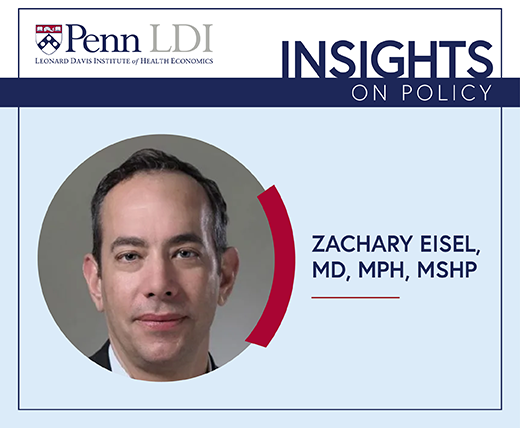
Estimated Overdose Deaths Due to the Loss of MOUD in the One Big Beautiful Bill Act
Research Memo: Delivered to House Speaker Mike Johnson and Majority Leader John Thune
News
Every 4.5 minutes in the U.S. a baby is born with a congenital anomaly like the absence or malfunction of fetal organs such as heart or spinal cord defects and other serious, life-threatening conditions. These issues are typically first recognized either by early blood tests or during the second trimester ultrasound scan. The diagnosis dramatically changes the nature and complexity of the perinatal care required and typically begins a period of extreme emotional stress for the family.

Since the first open fetal surgery was performed 40 years ago at the University of California, San Francisco, about 40 specialized fetal care centers (FCC) have opened in the U.S. These centers are based in either children’s hospitals, maternal care departments of adult hospitals, or as stand-alone facilities.
Over the last four decades, fetal care centers (FCCs) have evolved to serve this patient population, providing advanced multidisciplinary diagnostic assessments, counseling, postnatal care planning, and, in some cases, prenatal treatments.
Patients with pregnancies complicated by severe fetal conditions are at higher risk for perinatal depression, anxiety, and PTSD. They also face societal and structural barriers to accessing the care, including increasing abortion care restrictions and stigma, the significant time and resource burden of frequent ultrasound monitoring, and practical obstacles to undergoing procedures that require bed rest or relocation to hospitals performing prenatal or postnatal surgery.

Addressing these psychosocial concerns has been the focus of research by Abigail Wilpers, PhD, WHNP-BC, an LDI Senior Fellow, Assistant Professor at the Penn School of Nursing, and faculty member at the Children’s Hospital of Philadelphia (CHOP) Research Institute.
In a 2021 synthesis of the literature related to the topic, she wrote, “The diagnosis of a fetal anomaly during pregnancy can be traumatic and life changing for expectant parents, who have sometimes described feeling ‘shattered’ by this experience. Although there have been important advances in diagnosis and treatment of fetal anomalies, the care received by patients with a fetal diagnosis unfortunately does not always meet their needs.”
Her team’s two latest 2024 papers published separately in Fetal Diagnosis and Therapy and the Journal of Personalized Medicine focused on developing a system for measuring the quality of the person-centered-care provided by FCCs. The first is entitled, “Development and Validation of a Scale to Measure Person-Centered Care in Fetal Care Centers,” and the second is “Differences in Person-Centered Care in Fetal Care Centers: Results from the U.S. Pilot Study of the PCC-FCC Scale.”
The National Academies of Sciences, Engineering, and Medicine define person-centered care as: “Respect for patients’ values, preferences, and expressed needs. Patient-centered care responds precisely to each patient’s wants, needs, and preferences. It gives patients abundant opportunities to be informed and involved in medical decision making, and guides and supports those providing care in attending to their patients’ physical and emotional needs and maintaining or improving their quality of life to the extent possible.”

In an interview with LDI, Wilpers explained that psychosocial factors are as poignant as they are crucial in the overall care of patients experiencing fetal anomalies.
“Every individual and every family coming to an FCC are different,” Wilpers said. “For example, some families, when they find out that their fetus has absent or non-functioning kidneys, may choose abortion care in the hope of protecting their baby from suffering after birth. Others may choose perinatal palliative care in the hope of a compassionate death in the loving arms of family, and others may choose intervention before and or after birth in the hope of giving their baby a chance at a longer life. As you might imagine, the conversations with these families really must be different, and the services that they might access, and desire are also going to be very different. And so, we can’t just deliver standard counseling, we can’t just deliver standard services. That’s where person-centered care comes in—care that is respectful of and responsive to an individual’s preferences, needs and values.”
But that kind of care doesn’t always happen.
In her latest Fetal Diagnosis and Therapy paper, Wilpers noted that, “Since the Supreme Court overturned federal protection for abortion in its Dobbs v. Jackson Women’s Health Organization ruling, FCCs’ ability to provide person-centered care to patients who desire a termination of pregnancy is in question. Also, increasing evidence suggests that the effects of individual and structural racism play major roles in how people of color experience perinatal care. For that reason, we incorporated items into our scale that directly address pregnancy-related health care experiences of people of color.”
“The goal of our study was, first and foremost, to develop and validate an instrument to measure person-centered care in fetal care centers,” said Wilpers. “It asked, ‘How well are these centers providing care that is respectful of and responsive to any and all individuals’ preferences, needs and values?’ We worked with clinical experts from across the country and a diverse group of folks with lived experience of being patients. We had people who had experienced all sorts of different outcomes, whether it be perinatal loss or had maternal-fetal surgery or had a neonatal intervention like surgery on the baby’s heart only days after their birth. The exciting result of the study was that we have developed a valid instrument for measuring person-centered care in these high-risk settings.”
“Findings from our study were generally very positive,” she continued. “We found that of our 247 participants, the vast majority had really positive experiences of care in their fetal care centers. We heard families talking about the compassionate care, the very respectful care, and the relationships that they built with their care team. However, we also saw 38% of people give negative comments. We also had 8% of participants score below the midpoint for the person-centered care scale.”
One consistent area in need of improvement was communication,” said Wilpers. “Even though as clinicians, communication is one of the things we all do the most, it is in fact one of the things that we get the least training in. That’s why clinicians going into this field have reported feeling unprepared to have these types of complex counseling conversations with families. We have seen evidence where a clinician is attempting to say something reassuring to their patient who’s trying to make decisions about a complicated pregnancy and the clinician says something like, ‘You can always have another baby.’ Now, unfortunately, we know that that kind of response can cause psychological harm.”
“Another communication challenge was clinicians’ ability to personalize discussions around abortion care.” Wilpers continued. “For example, time-based limitations on abortion care often prompt clinicians to ensure that patients are fully informed about their options and the time constraints involved. But these patients see many different providers and if every single provider reminds them that they could have an abortion—even if they’ve said to their first provider that that was not their care choice—the patient can feel like they’re being pressured.”
“In addition to those communications challenges,” said Wilpers, “we also saw evidence of patients not understanding or not being told what to expect from a fetal care center model. Multiple participants in this study felt abandoned by their FCC after giving birth. Notably, after returning home from a maternal-fetal procedure, some participants reported that they and their local providers were unprepared for resulting maternal health complications. This lack of preparation from the FCC complicated their diagnosis and treatment.”
“Additional care delivery training, especially communications is really needed. And while our person-centered care scale for fetal care centers is designed for these particular places, I think it would be helpful if policymakers think about how these kinds of concepts should also be implemented at other related care sites. It is not only in fetal care centers where it’s important that you understand how to speak to someone who’s going through an experience like this and what kinds of resources you can direct them to. We need to expand the expertise that is now well siloed in these centers and really be able to educate a broader community of clinicians to care for these families and create strong FCC referral systems and relationships so that nobody is unable to access the care that they need.”
In another area of concern, Wilpers noted that FCC care is not accessible to many people that need it.
“I would love to say that there are enough fetal care centers across the country to be able to provide this kind of holistic, coordinated approach to every family. However, there are going to be many people for whom accessing these kinds of resources is next to impossible. We are seeing some major disparities in who has access to the care and what kinds of experiences and outcomes people have,” she said.
In the last question, Wilpers was asked what else policymakers should take away from her study’s findings.
“I think the most important message for policymakers can be found in the words of the study participants,” said Wilpers. “They poignantly detail their experiences and how many of those experiences don’t reflect what we’re seeing in the reproductive laws that are being passed right now related to restricting reproductive services such as abortion care. I think looking at how actual people go through these experiences and what they say should be what informs our laws. And we have some robust data here that can be used by lawmakers to better understand the human experience of a fetal anomaly.”


Research Memo: Delivered to House Speaker Mike Johnson and Majority Leader John Thune

Research Memo: Delivered to House Speaker Mike Johnson and Majority Leader John Thune

Hospitals’ Current Cost Reports are Unreliable and Should be Improved, LDI Fellow Finds

If Federal Support Falls, States May Slash Home- and Community-Based Services — Pushing Vulnerable Americans Into Nursing Homes They Don’t Want or Need

Historic Coverage Loss Could Cause Over 51,000 People to Lose Their Lives Each Year, New Analysis Finds

Cited for “Breaking New Ground” in the Field of Hospital Operations